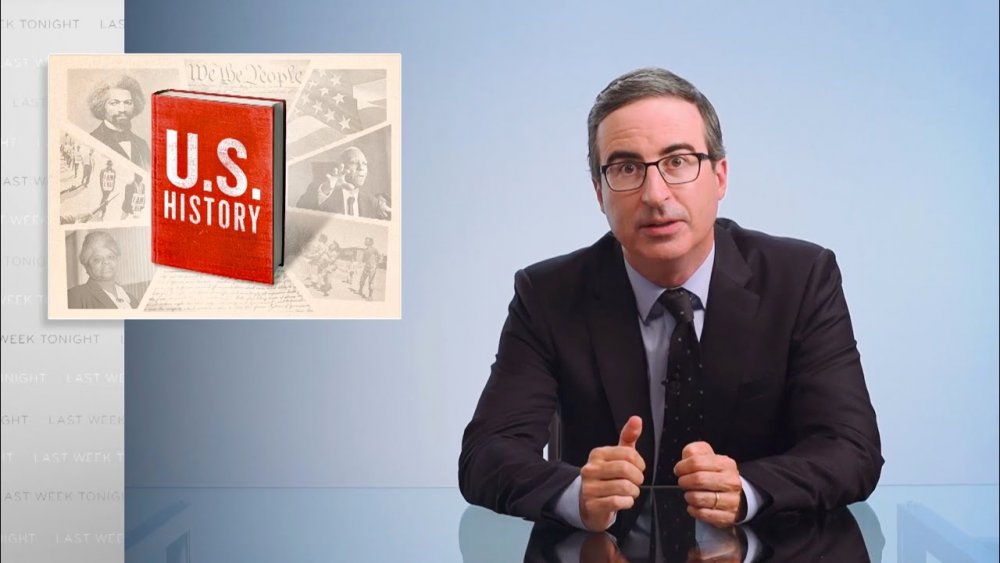The Untold Truth Of Last Week Tonight
You might know British comedian John Oliver from his tenure on Comedy Central's The Daily Show with Jon Stewart, or perhaps you discovered his viral YouTube segments from his current show, Last Week Tonight, which airs on HBO, but there's no denying that Oliver has become an entertainment powerhouse throughout the last few years. In these divisive political times, there's no shortage of real news programs and parodies — the latter of which includes The Daily Show, now hosted by Trevor Noah, Full Frontal with Samantha Bee, and more — but Oliver's show stands out from the pack, in case that wasn't apparent based on the series' truckloads of Emmy Awards alone.
However, regardless of whether you have always been a massive fan of Last Week Tonight, or you've just started binging Oliver's most popular YouTube clips, still more to learn about this inventive, funny, and exceedingly smart late night show. Here's the untold truth of Last Week Tonight.
How John Oliver got Last Week Tonight
Oliver started off as one of many correspondents on The Daily Show, alongside beloved host Jon Stewart, but when Stewart had to temporarily step away from the hosting desk, Oliver got a big chance to shine. During the summer of 2013, while Stewart took an extended break from the show to film his directorial debut Rosewater, Oliver was chosen as a guest host — and a star was born.
Oliver earned overwhelming praise for his hosting gig, thanks to his surefooted presentation from behind Stewart's desk, running gags involving Mystikal's "Danger" (as a reference to the Anthony Weiner scandal), and his smart, incisive worldview. Before long, outlets like Vulture were calling Oliver the "heir apparent" should Stewart step down, but ultimately, things went differently. Stewart wouldn't announce his departure until early 2015, and in the meantime, HBO made the wise decision to make a play for Oliver, offering him his own show just three months after his Daily Show stint, via Deadline.
The "John Oliver" effect
Unsurprisingly, Last Week Tonight became a resounding success right off the bat, giving Oliver a half hour once a week to talk about the biggest political and sociological stories happening throughout the world. However, Last Week Tonight is more than your typical late night show: it's been proven to produce positive real-world effects.
In 2015, Time Magazine writer Victor Luckerson wrote about what he dubbed the "John Oliver Effect," explaining, "it's not every day that a comic's jokes crash a government website or directly inspire legislators to push for new laws." As Luckerson correctly points out, whether Oliver is starting a fake church to reveal the corruption and hypocrisy behind tax-exempt religious institutions or creating an anti-tobacco mascot, viewers listen, and take those lessons with them into the real world.
Since 2015, Oliver has only increased his real-world outreach, sparring with everyone from Ramzan Kadyrov to, as Vulture explains, the entire town of Danbury, Connecticut, but in the end, he still manages to inspire his viewers to make real-world change, just by creating insightful and informative segments that teach his audiences something new every week.
John Oliver's approach to the news is exhausting and pragmatic
Oliver may be a jokester from behind his desk, but he takes his hosting responsibilities — and his research — incredibly seriously.
First, it's important to note that for Oliver, nobody is off-limits; as he told The Hollywood Reporter in 2014, he has total creative freedom over Last Week Tonight, and is even allowed to criticize corporations (loyal fans know how often he goes after AT&T, his "business daddy," which owns HBO). However, he also does a ton of research for his hosting gig. That starts with intensive homework, where Oliver goes through media coverage of current events to find bad takes. When The Atlantic asked Oliver what he reads, back in 2014, Oliver said, "I don't really regulate it. I basically imbibe the news all day in all forms. As soon as I get up I'll maybe put on CBS This Morning and then flick around. So, yeah, I guess I'm probably not going to have your classic response because I basically have to watch everything. [...] I'm watching with a certain thing in mind and that is how to see a story told badly."
Beyond that, because Last Week Tonight airs on Sundays, Oliver and his team tend to look for stories that haven't been covered to death by the end of the week. As Oliver once told an interviewer, "If something happens on a Monday, realistically all the meat is going to be picked off that bone by the time it gets to us — there's probably barely a point in doing it... I think we'll be attracted to some extent by stories that are off the grid."
Every episode of Last Week Tonight is available to stream on HBO Max now.



